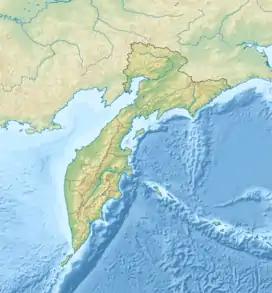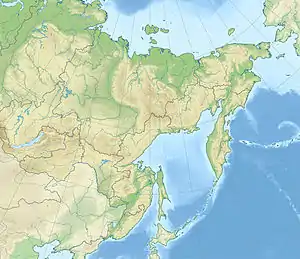| Ichigem Range | |
|---|---|
| Ичигемский Хребет | |
 View of the Penzhina with the Ichigem Range in the background | |
| Highest point | |
| Peak | Unnamed |
| Elevation | 1,465 m (4,806 ft)[1] |
| Coordinates | 63°18′31″N 165°33′54″E / 63.30861°N 165.56500°E[1] |
| Dimensions | |
| Length | 400 km (250 mi) E/W |
| Width | 100 km (62 mi) N/S |
| Geography | |
 Location in Kamchatka Krai  Ichigem Range (Far Eastern Federal District) | |
| Location | Magadan Oblast Kamchatka Krai, Russia |
| Range coordinates | 63°40′N 164°0′E / 63.667°N 164.000°E |
| Parent range | Koryak Highlands East Siberian Mountains |
| Geology | |
| Orogeny | Alpine orogeny |
| Age of rock | Cretaceous[2] |
| Climbing | |
| Easiest route | From Kamenskoye |
The Ichigem Range (Russian: Ичигемский Хребет) is a range of mountains in Magadan Oblast and Kamchatka Krai, Russian Far East.
Administratively most of the range falls within the Penzhinsky District of Kamchatka Krai, but the western end reaches into the Severo-Evensky District of Magadan Oblast.[3]
History
The area of the Ichigem Range was first mapped by geographer and ethnologist Baron Gerhard von Maydell (1835–1894) during his pioneering research of East Siberia.[4]
Geography
The Ichigem Range is the northwesternmost range of the Koryak Highland system.[5] It stretches from WSW to ENE between the upper Penzhina valley to the north and the basin of the Oklan, a Penzhina right tributary, to the south. The Kolyma Mountains rise at the western limit of the range and the waterlogged lower Penzhina valley marks its eastern end.[3] The mountains of the Ichigem are of moderate altitude. They are covered with tundra vegetation and have a barren look. The highest point of the range is an unnamed 1,465 metres (4,806 ft) high peak, located in the central sector of the range.[6]
There are numerous vestiges of ancient glaciation in the Ichigem Range, but no modern glaciers. River Oklan has its sources in Mount Stolovaya of the western part of the Ichigem and flows roughly eastwards along the southern limits of the range, beyond which rises the Oklan Plateau (Окланское плато).[1][6]
See also
References
- 1 2 3 Atlas of Russia
- ↑ Калясников Ю.А. Наноминералогия воды и биосферные процессы. Публикуется по тексту: Калясников Ю.А. Наноминералогия воды и биосферные процессы: 2-е изд., перераб. и доп. Магадан: СВНЦ ДВО РАН, 2000. 64 с.
- 1 2 Google Earth
- ↑ Siberian History - МАЙДЕЛЬ Гергард Людвигович
- ↑ Mark Nuttall ed. Encyclopedia of the Arctic, p. 1054
- 1 2 "Топографска карта P-57_58 - Topographic USSR Chart (in Russian)". Retrieved 22 February 2022.